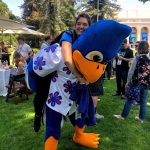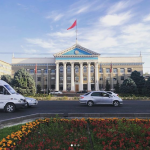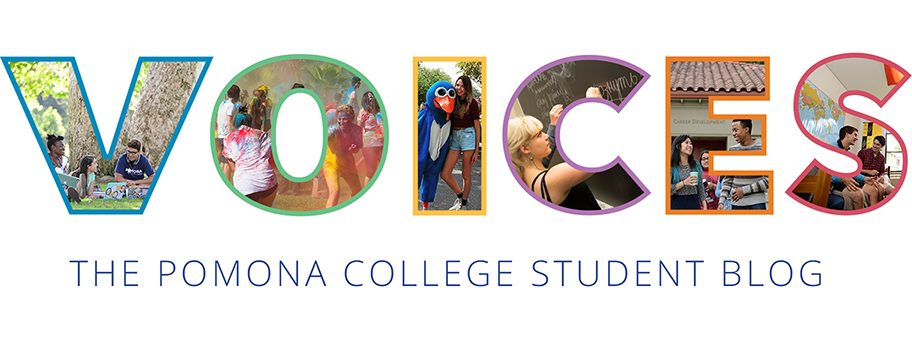By Dakota Crookston ‘21
My parents met online, I found Pomona through a web search, and I’m flying to Kyrgyzstan in seven hours because I googled “intensive russian study summer.”
My trek started late last August, when I was scrubbing the internet for summer opportunities to learn Russian abroad. Unfortunately, the well-known Critical Languages Scholarship was out of the question for me—they didn’t take wannabe Russian speakers, only students with two years of prior study. Other programs I came across were too expensive and were held at unreviewed, obscure institutions. I hit the ninth page of google search results before stumbling across Arizona State University’s Critical Languages Institute: an affordable summer program where I could cover an entire year of Russian in eight weeks, followed by an optional four-week homestay in the Russian-speaking city of Bishkek, Kyrgyzstan. They did not charge tuition but instead a flat administrative fee. Additionally, they offered generous need-based aid and merit scholarships. Simply put, it was perfect.
The application was due January 25th, and because I’m still working on my procrastination, I didn’t really start until two weeks before then. Unfortunately, I didn’t realize the scholarship application required a letter of recommendation. I’ve always felt nervous asking for letters of rec, but emailing a professor during winter break at the last minute to do me a favor was a whole new level of discomfort and anxiety. Still, I bit the bullet and typed up an overly formal, slightly apologetic email. My professor responded quickly and enthusiastically, agreeing to write the letter. I sent in my application and got the news within weeks: I was accepted into the program!
Except I couldn’t afford it. I was waitlisted for the merit scholarship and not offered a need-based fee reduction. Still, I wasn’t worried. I had time and options. The Gilman Scholarship looked like my best bet. It’s a State Department scholarship for students studying abroad, including over the summer, and they even had special funding for students studying critical languages, including Russian. I felt unusually confident about my application and sat on my high hopes without looking into other avenues of funding. Which is how I ended up 19 days until the program started with zero dollars and a fat rejection stamped with The Great Seal of the United States.
So there we were: the end-of-semester grind was just kicking into gear and I was down about $8,500. This was the cost of the domestic program fee, program fee abroad, roundtrip flights, housing and food in Tempe. My summer plans and, more significantly, aspirations to study abroad and learn Russian were at a dead end. I like to think I’m good at making things work, but I was watching it all slip away, and I didn’t know what to do next. I felt like there was no chance of making things work, but I needed to try.
And so, in between classes and my job and final projects, I got to work. First, I put my meager savings from work study aside. I asked everyone in my family if they could pitch in a bit, and I met with my financial aid officer to see if I could take out any more loans. Next, I emailed the Institute and professionally pleaded to be reconsidered for need-based aid. They said “Sure,” and just like that, gave me a $1,000 fee reduction. I was taken aback that it was that easy.
Still, the savings and loans, donations and fee reduction amounted to a fraction of what I needed. So I emailed the chair of Pomona’s Russian department, explaining my situation and looking to discuss alternative funding opportunities. Again, I was nervous: I didn’t have a relationship with the Russian department, and I braced myself for them to politely tell me “Good luck.”
I was wrong. Pomona’s Russian Department offers two summer research grants every year for Russian/Russian & Eastern European Studies majors and minors who have taken four semesters of Russian. I never applied, as I don’t meet those criteria. But, in meeting with the chair, I learned that not a single student applied for these grants. Even though it was far past the deadline, and I was not the usual candidate, they made me an offer: write a short letter expressing my interest in the program, commit to minoring in Russian, and the Russian faculty would consider my proposal. Not twelve hours after sending in my letter, they offered me partial funding for the program and enthusiasm to have me in the department.
 Yes! I couldn’t believe it. I was more than halfway there. I had two more ideas, but I wasn’t confident in either. First: the European Union Center of California at Scripps College offers stipends for students pursuing summer internships with EU-related content. Despite the fact my program was not an internship, and Russia is not in the EU, I decided to try. I asked my politics professor for tips on how to pitch my application. Not only did he help me, but he offered to write me a letter of rec, even though the app was due the next day. I submitted it on Friday, and was offered the stipend on Monday.
Yes! I couldn’t believe it. I was more than halfway there. I had two more ideas, but I wasn’t confident in either. First: the European Union Center of California at Scripps College offers stipends for students pursuing summer internships with EU-related content. Despite the fact my program was not an internship, and Russia is not in the EU, I decided to try. I asked my politics professor for tips on how to pitch my application. Not only did he help me, but he offered to write me a letter of rec, even though the app was due the next day. I submitted it on Friday, and was offered the stipend on Monday.
All of my shots had scored, and I had the funds for everything except flights and housing. Trying to raise funds was emotionally exhausting, especially paired with the stress of finals week. But I kept getting closer, and I had to keep going, for myself and for every person who had helped me get to this point. As a final attempt, I emailed the Office of the Dean of Students asking for support.
 My desperate and last-minute plea was considered, and ultimately they were delighted to offer me the remaining support I needed. The gratitude and relief I felt overwhelmed all of the stress and doubt I had been carrying. It was five days before the program started, and everything had finally come together, against all odds. I had initially failed, facing rejection from three different outside scholarships, but was able to fall back on the many opportunities for support at the 5Cs. For the first time, I let myself fully imagine speaking Russian, studying the language abroad, and living with a host family. This was a reality I never thought would be available to me even a year ago.
My desperate and last-minute plea was considered, and ultimately they were delighted to offer me the remaining support I needed. The gratitude and relief I felt overwhelmed all of the stress and doubt I had been carrying. It was five days before the program started, and everything had finally come together, against all odds. I had initially failed, facing rejection from three different outside scholarships, but was able to fall back on the many opportunities for support at the 5Cs. For the first time, I let myself fully imagine speaking Russian, studying the language abroad, and living with a host family. This was a reality I never thought would be available to me even a year ago.
I came to Pomona because it was the most affordable option for me, and I am endlessly grateful to say that the support that got me in the door did not end there. I owe every bit of thanks to the professors, departments, and institution who believe and invest in me.
